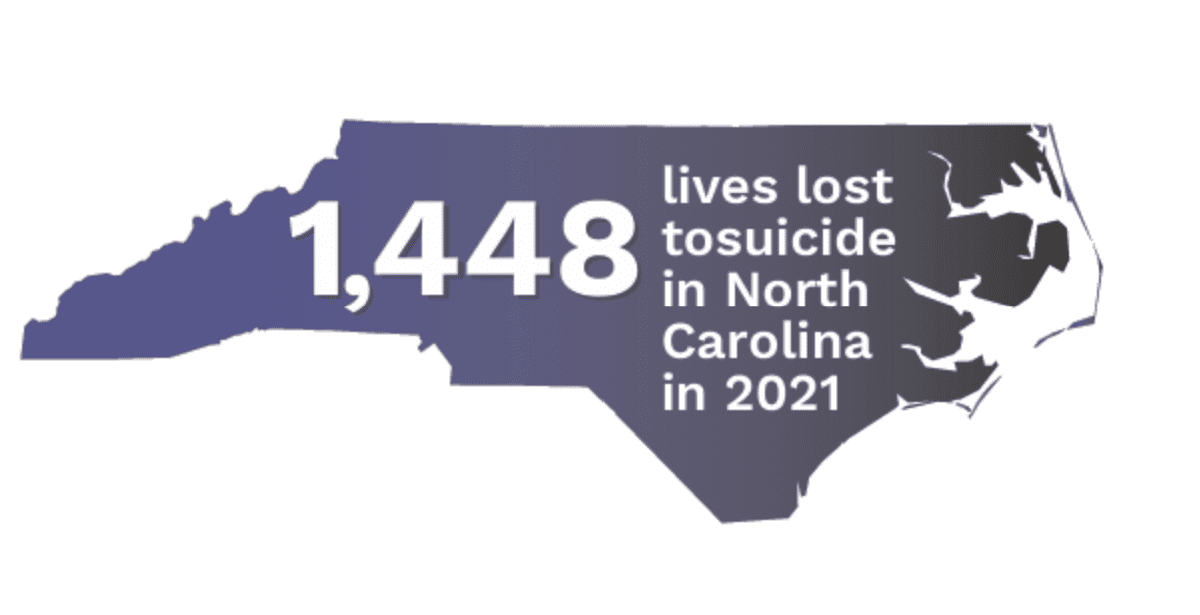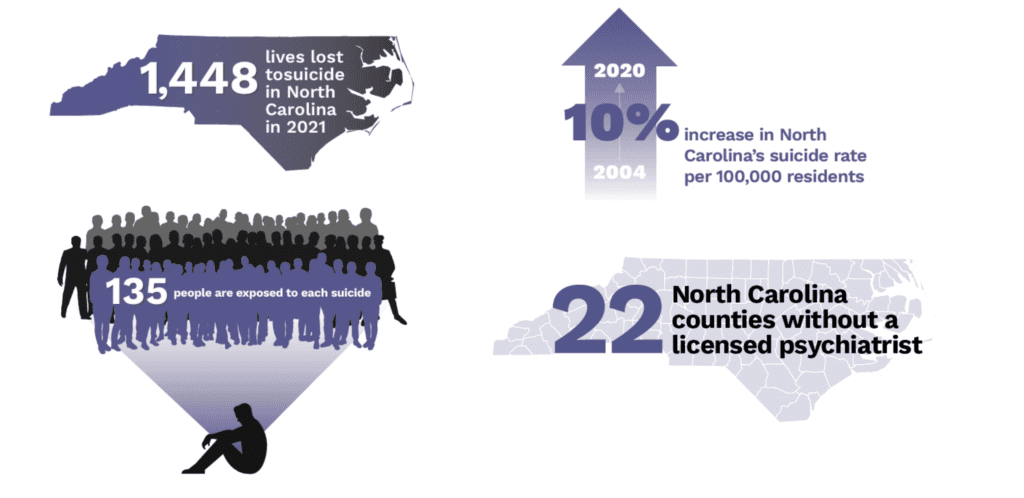
Share this story
|
|
The University of North Carolina at Chapel Hill announced on Aug. 23rd the selection of 15 local teams across North Carolina that will work to address mental health challenges and reduce suicides.
“Our State, Our Wellbeing” is a 12-month initiative to identify and implement strategies to improve mental health statewide, launched by Carolina Across 100 and the UNC Suicide Prevention Institute.
“People don’t really understand who dies by suicide,” said a licensed psychologist in this brief. “This is anybody. Anybody can find themselves in a mental health crisis or in a life crisis where they feel like they can’t go on.”
“Every suicide is a tragic event. Our goal with this project is to help North Carolina communities get more involved in prevention efforts.”
— Anita Brown-Graham, Gladys Hall Coates Distinguished Professor of Public Law and Government at the UNC School of Government
Why this work?

Carolina Across 100 first announced “Our State, Our Wellbeing” in June in response to alarming increases in rates of suicide and mental health crises in recent years.
From 2004 to 2020, the number of suicides per 100,000 residents in North Carolina grew by more than 10%, according to the release.
More recently, the disruptions brought on by the COVID-19 pandemic exacerbated risk factors related to mental and behavioral health.
“Both the total number and the rate of suicides have increased in North Carolina over time,” said Patrick Sullivan, director of the UNC Suicide Prevention Institute. “By bringing experienced local partners together to share ideas and identify next steps, we will be better positioned to design effective strategies that are localized and sustainable.”
While the data is cause enough for concern, available data may not capture the full scope of the challenge for a few reasons, finds this analysis:
- Suicide deaths and attempts are sometimes classified under a different cause, such as an overdose, due to the additional due diligence required to prove that the death or attempt was intentional.
- Stigma may lead people to underreport suicidal ideation or mental and behavioral health problems.
Meet the community collaboratives
The 15 teams in the “Our State, Our Wellbeing” initiative are composed of health providers, government agencies, educational institutions, faith-based groups, and civic and nonprofit organizations.


Teams were selected through a competitive application process led by a panel with representatives from Carolina Across 100, UNC Suicide Prevention Institute, UNC Rural, and other experts in mental health and suicide prevention.
Existing statewide efforts to respond
According to this brief on understanding suicide and prevention, policymakers and other leaders are taking steps to reduce suicide and address mental and behavioral health challenges in a variety of ways, including:
- The 988 Suicide & Crisis Lifeline launched in July 2022. The new line replaces the previous 1-800 number and is meant to make it easier for people experiencing suicidal ideation or a mental health crisis to get care. As part of the 988 rollout, the state made new investments in capacity for call centers.
- North Carolina is one of 17 states funded through the CDC’s Comprehensive Suicide Program, which funds efforts to implement and evaluate public health approaches to suicide prevention.
- North Carolina Department of Health and Human Services has recently updated its Suicide Prevention Action Plan and included a variety of action steps and targets around suicide and mental and behavioral health in its most recent State Health Improvement Plan.
- Earlier in 2023, Gov. Roy Cooper and legislative leaders issued proposals to invest $1 billion from Medicaid expansion funds to strengthen the state’s mental and behavioral health care system. As of this writing, the biennial state budget is still being negotiated, but signs point to new investments in this area of care.
Additional resources include this mental health dashboard, resources from the Centers for Disease Control and Prevention, and this data on suicide and self-inflicted injury.
The impact on survivors and communities
The ripple effects of suicide are devastating.
“Despite the importance and potential impact of state-level interventions to strengthen prevention efforts and improve mental and behavioral health supports, suicide is ultimately a deeply personal, human issue,” writes Michael Welker, the community engagement director for ncIMPACT.
This story by Natalie O’Brien, a research instructor at the Foundation of Hope Child and Adolescent Anxiety and Mood Disorders Program (CHAAMP), looks at the impact of suicide on survivors and communities through the lens of her own loss.
“I woke up that morning thinking it was just another day, but it was the day that my life and my children’s lives were forever changed.”
— Natalie O’Brien, researcher, wife, mom
If you or someone you know are thinking about suicide, please call or text the Suicide & Crisis Lifeline at 988.
What happens next?
The teams participating in the “Our State, Our Wellbeing” initiative represent urban, suburban, and rural areas covering every region of North Carolina. Seventeen of the 24 counties have not previously participated in a Carolina Across 100 program, moving the initiative closer to its goal of implementing programs in all 100 counties.
Teams will meet for a kick-off event at the end of August and for their first forum at UNC-Chapel Hill in late October. Over the course of the next year, the 15 teams will meet in Chapel Hill for a series of forums to work toward developing their own goals to improve mental health supports and reduce suicides. These forums will offer participating teams the opportunity to learn from one another and from experts in community collaboration, public health, and suicide prevention. The Carolina Across 100 team and UNC Suicide Prevention Institute will also provide coaching, technical assistance, and additional resources to teams throughout the program.
“The University is eager to bring communities together from across North Carolina to enhance our work and foster collaboration to improve mental health and reduce suicide in our state. Carolina Across 100’s work will build partnerships and create new opportunities for sharing ideas to address this critical issue,” said UNC-Chapel Hill Chancellor Kevin Guskiewicz.
Carolina Across 100 is a five-year initiative, coordinated by the ncIMPACT Initiative, seeking to support community-driven recovery and build sustainable efforts in all 100 counties by providing human resources, data insights, coaching, facilitation, coordination efforts, and program design.
“Our State, Our Wellbeing” is the second major program of ncIMPACT, following the “Our State, Our Work” program started in 2022.
The UNC Suicide Prevention Institute began in July 2022 to research and deploy scalable, evidence-informed prevention interventions for suicide. Housed at the School of Medicine, the Suicide Prevention Institute has more than 40 UNC researchers across a variety of disciplines including psychiatry, psychology, social work, and education.
Behind the Story
This story is excerpted from the following sources provided by ncIMPACT:
Here is the press release.
Here is more information about the “Our State, Our Wellbeing” initiative, including the resource list.
Here is the program announcement.
Here is the issue brief.
Here is the story on the impact of suicide.




